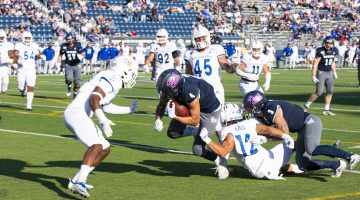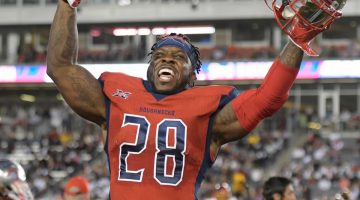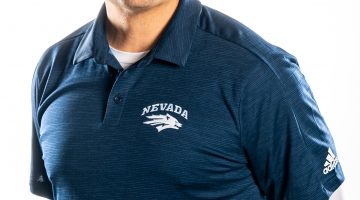
Quinsey Sablan/Nevada Sagebrush
Dameon Baber participates in defensive drills during a Nevada practice at Mackay Stadium.
by Jack Rieger
If you spend any significant amount of time at a Nevada football practice this fall camp, you’ll probably hear the defense’s new catchphrase: run and hit.
The new slogan is echoed regularly to represent the Wolf Pack’s new aggressive, confrontational attitude. Defensive coordinator Scott Boone is debatably the most frequent user of the new motto and is proud of what it represents.
“It’s about block destruction, shedding blocks, running to the ball and tackling,” Boone said. “So we just go run and hit, that’s our concept. We try to tell our guys constantly to play defense but not defensive. It doesn’t matter what defense is called.”
Boone is entering his third year as Nevada’s defensive coordinator. His impact on the unit has led to a stingier defense, as the Wolf Pack went from allowing 34.4 points per game in 2013 to 27.2 in 2014 and 26.8 last season.
Boone will be facing his biggest challenge this season, as Nevada lost six of its front seven starters from last season. That group includes Los Angeles Ram Ian Seau and Oakland Raider Lenny Jones, both of whom were pass rushing linebackers with NFL skill sets.
Nevada’s “tampa two” defense utilizes four defensive linemen and three linebackers. All four of Nevada’s starting defensive linemen have at least one year of game experience, and defensive end Malik Reed is expected to become a significant contributor this season as a pass rusher.
The Wolf Pack linebackers are the defense’s most inexperienced unit going into the season. Starting middle linebacker Gabe Sewell is a redshirt freshman with zero game experience. Weak side linebacker L.J. Jackson and strong side linebacker Alex Bertrando are both seniors, but lack significant game experience. Bertrando’s six starts lead all linebackers, but his 2015 season was cut short due to a knee injury. Bertrando doesn’t believe that the Wolf Pack linebackers lack of experience will hold them back.
“I don’t think we’re more limited,” Bertrando said. “This year we have a more unselfish style of play. Last year, some guys maybe tried to do too much. Everyone on this defense is here to have a winning defense and not for themselves. Everybody plays very unselfish. Everyone just does their job and doesn’t care who makes the play.”
Coach Boone acknowledges that his linebacker core is young and that his “run and hit” strategy is in place to simplify things for that unit.
“Linebacking, that’s the issue where we have all new guys. Nobody has really played anything and those guys are good players, and we’re trying to keep it simple for them and let them just run around and hit.”
Boone’s defense has been modified over the last few seasons to accommodate the experience of his players. The defensive unit will continue to prioritize stopping the run.
“We’re kind of away from as much Tampa as we’ve played in the past but it’s still a four down defense, where we have a good package to stop the run first and then play the pass as we need to,” Boone said. “Our focus has been to try to get as many people around the football as we can through defensive formations and getting the safeties down when we need to or the corners down when we need to, whatever we need to do to get the extra hitter in the box. Our defense hasn’t changed philosophically or scheme wise, we’re still going to have the same defense. It may not be as expansive as it was with a bunch of veterans, but we’ll build to it as we go through camp.”
Boone’s decision to prioritize stopping the run makes plenty of sense, considering Mountain West teams rushed the ball 61.2 percent of the time in 2015, which is the highest in the country by a large margin. The MWC is loaded with running backs, including San Diego State’s Donnel Pumphrey, Wyoming’s Brian Hill, and even Nevada’s James Butler.
The Nevada defense’s greatest strength this season is its secondary, which returns sophomore Dameon Baber, who led the team with six interceptions and 65 tackles at the strong safety position. Baber was also the only member of the team named to first team MW. Free safety sophomore Asauni Rufus led the 2015 team in tackles and senior corner Elijah Mitchell is an ultra-athletic cover corner.
Baber had a historically good freshman year for Nevada and is looking to make the jump to a defensive leader in 2016.
“From the beginning in my freshman year, I wasn’t really getting that many reps in fall camp,” Baber said. “But now this fall camp I’m trying to step into that leadership role and help younger guys, help the veterans, and play my role on this team.”
Coach Boone credits Baber’s smarts and physical gifts for his early success.
“What he does is he’s smart, he studies film and has an idea of what he’s seeing,” Boone said. “Plus he’s tough, he’s a physically tough kid. We’ve got a safety that plays like a linebacker and covers like a safety. That’s why he’s as good as he is.”
When asked what the greatest strength of his defense was, Boone was quick to point to his standout safeties, Baber and Rufus.
“I think the fact that we have two safeties who have played a lot of football,” Boone said. “Those guys can get us lined up right and can make the adjustments that need to be made. Our secondary is experienced. If you have an experienced secondary, you can make up for some mistakes.”
If the Wolf Pack defense is going to continue to trend in the right direction, as it has for the past two seasons, the inexperienced linebacker group will need young players like Gabe Sewell to emerge as playmakers. Nevada will also depend on its playmakers in the secondary to create turnover opportunities and prevent the talented Mountain West running backs from creating explosive plays.












